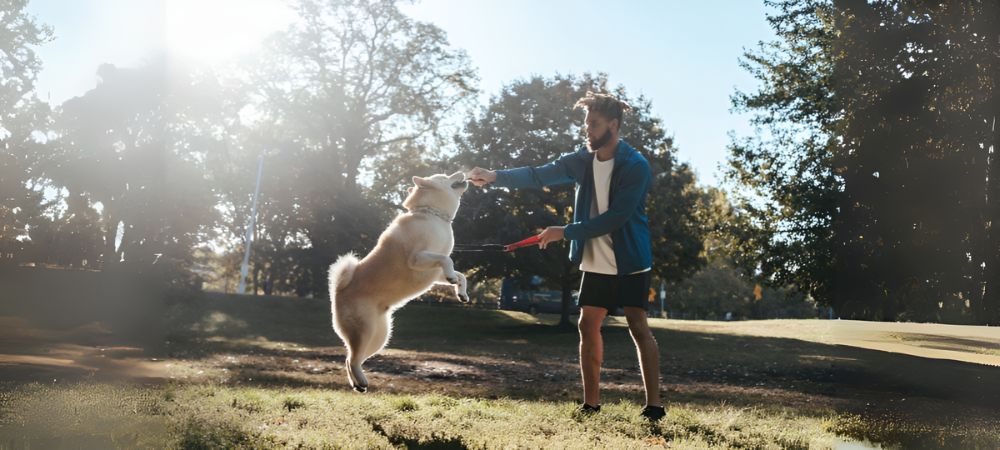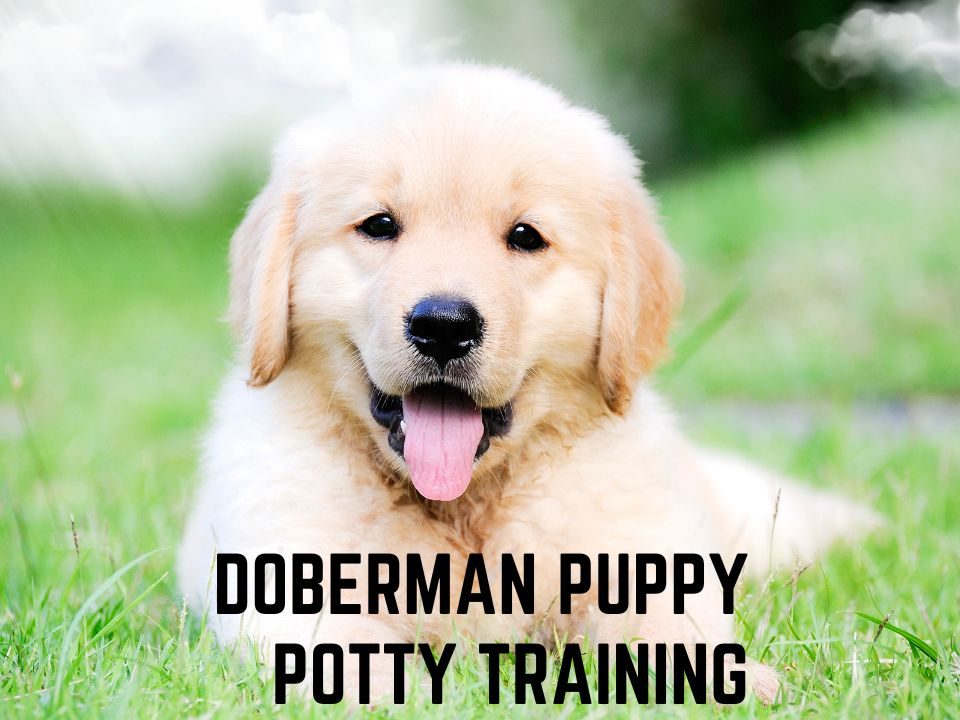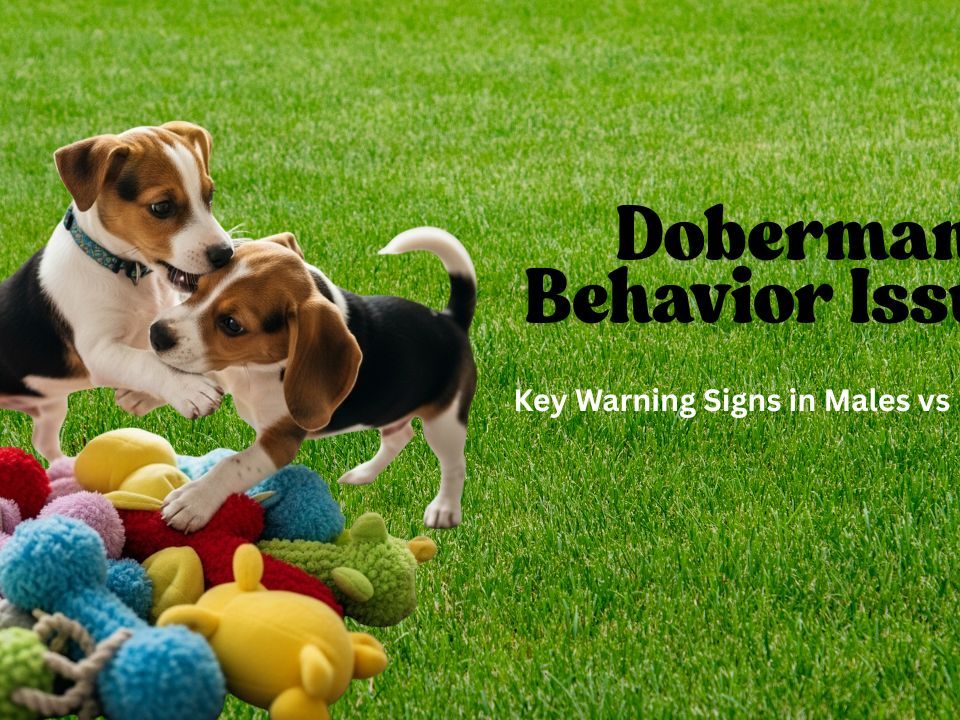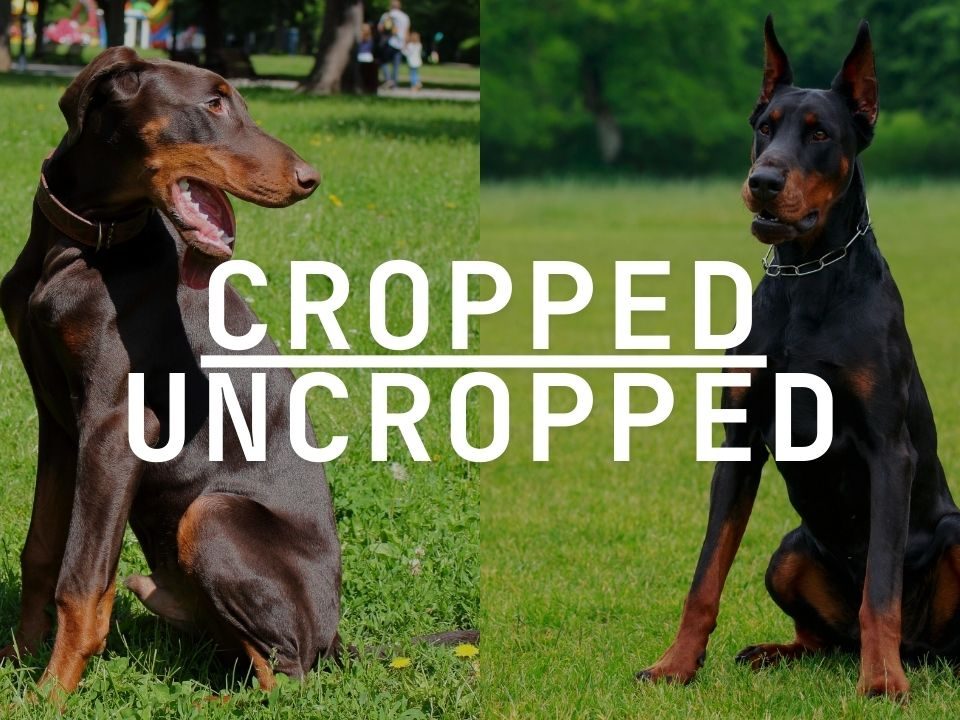
Doberman Puppy Potty Training: A Guide With Useful Tips
May 20, 2025Quick Summary
- Training a Doberman puppy can be a rewarding journey when you start early and stay consistent.
- This guide covers 13 essential tips for first-time owners, from establishing routines and socialising your pup to teaching basic commands and preventing destructive behaviours.
Bringing a Doberman puppy into your life is exciting and overwhelming. These dogs are smart, loyal, and protective but also have a lot of energy and a strong personality. If you’re a first-time Doberman owner, you might be wondering how to start training a Doberman puppy. The truth is, raising a Doberman puppy can be challenging, but the rewards are totally worth it.
Training early is one of the best things you can do for your puppy and yourself. It’s not just about teaching commands or stopping unwanted behaviour—it’s about creating a connection based on trust and understanding. When you begin training from the start, your Doberman will grow up feeling secure and confident, and you’ll find it easier to guide them through life’s ups and downs. Early training helps prevent problems before they even start, making life smoother for both of you.
In this guide, we will be discussing 13 important tips on How To Train a Doberman Puppy, covering everything from setting up a routine to socialising your puppy and understanding their unique traits. With some patience and consistency, you’ll be on your way to raising a happy, well-behaved Doberman.
Start Training Early

The best time to start training your Doberman puppies is when you bring them home, usually around eight weeks old. Beginning early helps set the foundation for good habits that will last a lifetime. Puppies are like sponges at this age, soaking up everything around them, so it’s the perfect window to introduce basic commands and boundaries.
Consistency is absolutely crucial. Make sure everyone in the household is on the same page about the rules and follows them every day.
One of the doberman training tips include using positive reinforcement to encourage good behavior. Instead of focusing on what your puppy is doing wrong, reward them with praise, treats, or playtime when they get it right. This approach builds your puppy’s confidence and makes training a fun experience for both of you.
Establish a Routine
Dobermans thrive on routine. They’re intelligent dogs who feel more secure when they know what to expect each day. Establishing a consistent daily schedule is one of the best things you can do for doberman training.
Try to set regular times for feeding, potty breaks, playtime, and training sessions. When your puppy knows when it’s time to eat, go outside, or settle down, it helps them feel more in control of their environment and is a positive reinforcement for dobermans.
A predictable routine also makes it easier for your Doberman to learn house rules and build good habits. For example, scheduled potty training doberman puppies behave well in this regard—similarly, set training times to give your puppy a chance to focus and learn without being overwhelmed.
Consistency not only keeps your puppy calm and happy, but it also makes life easier for you as the owner. Over time, your Doberman will naturally start to follow the flow of your household, making training and daily life more enjoyable for everyone.
Socialise Your Puppy
Early socialisation is one of the most important parts of raising a well-rounded Doberman. These dogs are naturally alert and protective, so it’s crucial to introduce them to a variety of people, animals, and environments while they’re still young. This helps build their confidence and teaches them how to behave appropriately in different situations.
Start socializi doberman puppies by gently exposing your puppy to everyday sights and sounds like traffic, vacuum cleaners, or people wearing hats and sunglasses. Let them meet new people and interact with other friendly, vaccinated dogs in a safe, controlled way. These experiences teach your Doberman to prevent future issues like fear, anxiety, or aggression.
The doberman puppy training guide is another great option. They provide a structured environment where your pup can learn basic manners while getting used to being around other dogs and people.
The key is to make every new experience positive. Go slow, stay calm, and always reward your Doberman for handling new situations well.
Housebreaking and Crate Training
Housebreaking is one of the first significant challenges new puppy owners face. With a bit of consistency and patience, your Doberman will catch on quickly. The key is to stick to a regular potty schedule. Take your puppy out first thing in the morning, after meals, after playtime, and before bed. Puppies do best when they know what to expect, and a routine helps prevent accidents inside the house.
Thus, crate training doberman puppies can be a huge help during this stage. A crate gives your puppy a safe, quiet space to relax. It also speeds up the housebreaking process. Dogs naturally avoid going to the bathroom where they sleep, so using the crate wisely can teach your Doberman to hold it until it’s time to go outside.
The crate should never feel like a punishment. It’s not a time-out corner; it is your puppy’s den. Make it cosy with soft bedding and maybe a toy or two. Use treats and praise to help your Doberman associate the crate with positive feelings.
With the right approach, your puppy will start seeing the crate as a safe retreat and learn to do their business outside.
Teach Basic Commands

Once your Doberman puppy has settled into your home, it’s time to start with basic doberman training and commands. These are the building blocks of good behaviour and will make life with your pup much easier. Start with simple, essential cues like sit, stay, come, and leave it. These commands help keep your puppy safe and give you better control in everyday situations.
Use short, clear words for each command and stick to them. For example, don’t switch between saying “come” and “here”. Instead, choose one and use it every time. When your puppy follows a command correctly, reward them right away with a treat, praise, or playtime. This instant positive feedback helps them understand they did something right.
Keep training sessions short and fun, especially in the beginning. Puppies have short attention spans, so it’s better to practice for a few minutes a couple of times a day than to push them too long. With regular practice, your Doberman will start to pick up on these commands.
Leash Training
Leash training is an important step in helping your Doberman learn how to walk calmly by your side. Since Dobermans are strong and energetic, starting this early will make your walks much more enjoyable in the long run.
Begin the leash training doberman puppies by introducing the collar and leash gradually. Let your puppy wear the collar around the house for short periods so they get used to how it feels. Once they’re comfortable, clip on the leash and let them drag it around indoors under your supervision.
Start practising leash walking in a quiet, distraction-free space like your backyard or living room. Use treats and cheerful praise to encourage your puppy to stay close to your side without pulling ahead. If they start to tug, simply stop walking and wait until they return to your side before continuing.
Remember, leash training takes patience. Keep sessions short and positive at first, and gradually increase the difficulty by adding new environments and gentle distractions. With consistency and positive reinforcement, your Doberman will learn to walk on a leash with confidence and control.
Prevent Destructive Behaviors
Doberman puppies and doberman European puppies are naturally curious, and like all young dogs, they explore the world with their mouths. Chewing is a normal part of development, especially during teething.
To prevent destructive chewing, make sure your puppy has access to plenty of appropriate chew toys. Soft rubber toys, teething rings, or treat-dispensing toys are great options that keep their mouths busy and help soothe sore gums. Having the right toys around can make a big difference in steering your pup away from your furniture, shoes, or anything else they might find tempting.
If you catch your Doberman chewing on something they shouldn’t, don’t scold or punish them. Instead, calmly redirect their attention to a chew toy and praise them once they start using it. Over time, positive reinforcement for dobermans helps them learn which items are okay to chew and which are off-limits.
Address Barking and Whining
It’s normal for puppies to bark or whine, especially when trying to get your attention or adjusting to a new environment. But if it becomes excessive, it’s important to understand what’s behind the behavior so you can address it the right way and teach basic obedience for doberman puppies.
Start by figuring out the cause. Is your Doberman bored? Anxious? Hungry? In need of a potty break? Barking and whining are often a puppy’s way of communicating, and meeting their basic needs can help reduce the noise. Make sure your pup is getting enough physical exercise and mental stimulation throughout the day.
One common mistake is accidentally rewarding the behaviour. If your puppy learns that barking or whining brings attention, whether petting, eye contact or even scolding, they’re more likely to keep doing it. Instead, try to ignore the behaviour and only give attention when your puppy is calm and quiet. When they settle down, that’s the moment to praise or offer a treat.
Avoid Punitive Measures

When training your Doberman puppy, it’s essential to lead with patience and positivity. Using punishment or harsh corrections might seem like a quick fix, but it can actually do more harm than good. Dobermans are sensitive, intelligent dogs, and negative training methods can lead to fear, anxiety, or even aggression over time.
Instead of punishing your puppy for doing something wrong, focus on showing them what to do instead. Redirect Dobermans chewing unwanted stuff like shoes toward more appropriate actions. For example, offer a chew toy or ask for a “sit” instead of scolding. This is an important step in training doberman puppies to stop biting.
Positive reinforcement works wonders. When your Doberman does something right, reward them with praise, treats, or play. This teaches them that good behaviour gets good results and builds a stronger bond between you and your pup.
Consistency Across Family Members
Training a Doberman puppy is a team effort, especially if you live with family or roommates. To avoid confusing your puppy, it’s essential that everyone in the household follows the same rules and uses the same commands. If one person allows jumping on the couch while another doesn’t, your puppy won’t know what’s expected, which can slow down the training process.
Sit down as a family and agree on the house rules and training commands. For example, decide together whether “off” or “down” will be the cue to stop jumping, and make sure everyone sticks with it. This consistency helps to teach basic obedience for doberman puppies with less frustration.
It’s also a great idea to involve children in training sessions. Not only does it teach kids how to interact with the puppy respectfully, but it also builds trust and strengthens the bond between them. Just make sure young children are supervised and guided so training stays positive and safe for everyone.
Mental and Physical Exercise
Dobermans are high-energy dogs with sharp minds, so they need more than just a walk around the block to stay happy and well-behaved. Giving your puppy enough daily physical and mental exercise is essential for their overall health—and it can prevent a lot of common behaviour issues.
Start with physical activities like fetch, tug-of-war, or short agility exercises in the backyard. These not only help your Doberman burn off energy but also give you a chance to bond and practice basic commands in a fun way. As your puppy gets older, you can gradually increase the intensity and variety of physical exercise.
But don’t forget their brain. Dobermans are incredibly smart, and they love a challenge. Puzzle toys, treat-dispensing games, and regular training sessions are great ways to keep their minds busy. Even five to ten minutes of focused training each day can go a long way.
Remember, a tired puppy is a well-behaved puppy. When your Doberman gets the right balance of activity and mental stimulation, they’re far less likely to chew furniture or bark excessively.
Monitor Health and Nutrition
Taking care of your Doberman puppy’s health and nutrition is just as essential as training. Feeding a balanced diet suited to their age, size, and breed needs will give your puppy the energy and nutrients they need to grow strong and stay healthy.
Look for high-quality puppy food with the right mix of proteins, fats, and vitamins. Avoid feeding table scraps or foods that might upset their stomach. If you’re ever unsure about what to feed, your veterinarian can recommend the best options.
Speaking of vets, regular checkups are essential to keep an eye on your puppy’s development and catch any potential health issues early. Vaccinations, parasite prevention, and dental care are all part of a good health routine.
Proper nutrition supports not only your puppy’s physical growth but also their ability to focus during training and recover after play. When your Doberman is healthy and well-fed, they’ll have the stamina and mood to learn and thrive.
Seek Professional Help If Needed
Sometimes, despite your best efforts, training challenges can feel overwhelming. If you find that certain behaviours persist or you’re unsure how to handle a situation, don’t hesitate to seek professional help. Enrolling your Doberman puppy in obedience classes is a great way to get expert guidance tailored to your dog’s needs.
Professional trainers bring experience and tools that can make a big difference, especially with strong-willed breeds like Dobermans. They can help you understand your puppy’s behaviour, offer personalised training plans, and teach you effective techniques to handle tricky issues.
Conclusion
Raising a Doberman puppy can be both a challenging and incredibly rewarding experience, especially for first-time owners. Starting training early, establishing a consistent routine, and focusing on positive reinforcement are all essential steps in setting your puppy up for success.
Socialising your Doberman, teaching basic commands, and providing plenty of mental and physical exercise will help shape a confident, well-behaved companion. Don’t forget to pay attention to their health and nutrition, and seek professional help if you ever feel stuck.
Remember, patience and consistency are your best tools. Every puppy learns at their own pace, and the effort you put in now will pay off with a loyal, loving dog by your side for years to come.
If you’re ready to welcome a Doberman into your family or want expert advice on training your new puppy, European Doberman Breeder is here to support you every step of the way. Reach out today and take the first step toward building a strong, lifelong bond with your Doberman.
FAQs
When should I start training my Doberman puppy?
A.Start training as early as 8 weeks old to establish good habits and consistency from the beginning.
How important is socialisation for a Doberman puppy?
A.Socialization is crucial. Early exposure to different people, animals, and environments helps prevent fear and aggression later in life.
What are the basic commands I should teach first?
Begin with essential commands like sit, stay, come, and leave it. These build a foundation for more advanced training.




